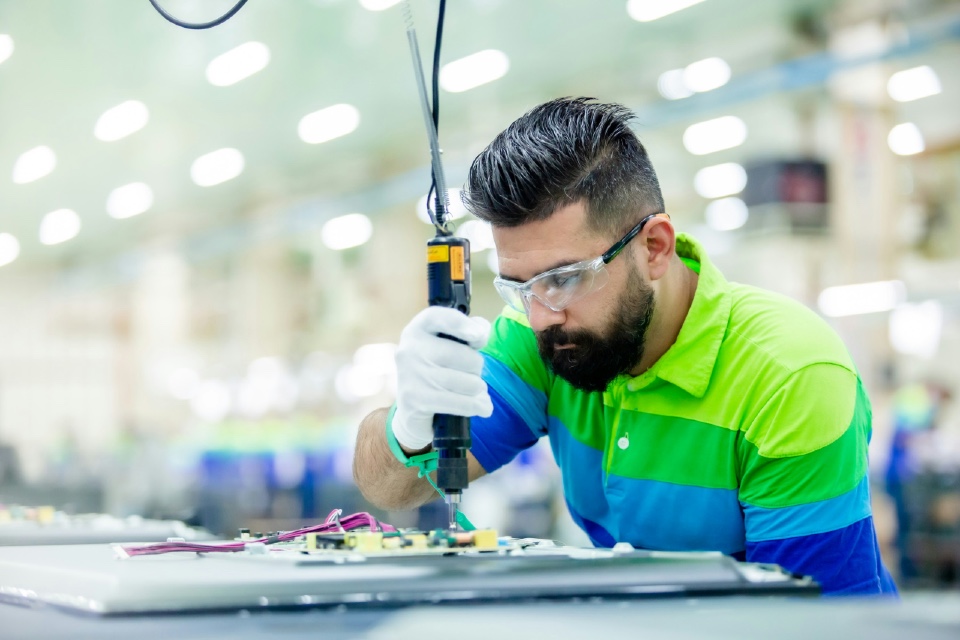Recent years have seen a growing number of UK-headquartered manufacturers bringing their production facility back to the UK. Strategies in how to do so have varied – some manufacturers are choosing to bring 100% of production back to our shores, while others are bringing the manufacture of certain products or specific sections of their build process.
Others still are adopting a ‘near-shoring’ strategy, bringing manufacturing closer to the UK with sustainability in mind. There are a number of different strategies being put into place – but what is driving this change?
Carl Johnson is UK Sales Director at Anglo Scottish Finance, provider of specialised finance lease solutions for businesses in the manufacturing sector. With his insight, we take a look at the reasons behind manufacturing’s return to the UK...
Why did production move away in the first place?
The initial decision for UK manufacturers to move production abroad in the first place was one driven primarily by cost. The cheapness and growing viability of international manufacturers in Asia and Eastern Europe proved lucrative for UK manufacturers, which facilitated a significant shift to manufacturing abroad in the 1980s and 1990s.
Then, in the wake of Brexit, studies suggested that as many as 33% of remaining manufacturing businesses were considering – or already actioning – a move away from UK soil. So, in 2025, what’s changed? Why are such a large number of UK manufacturers choosing to return home?
Combatting supply chain disruption
Supply chain disruption is the primary driving factor behind the increased push towards reshoring, with 95% of executives listing supply chain resilience as a top priority in 2025, up 69% from the previous year.
Part of this is due to the commonality of supply chain disruption, with one study from 2024 finding that more than 76% of European shippers had been impacted last year. Almost a quarter of those interviewed reported more than 20 disruptive incidents, indicating how reasonably commonplace events can impact your business’s ability to maintain required production levels.
“It doesn’t have to be a seismic world event to disrupt your supply chain,” says Johnson, “although the most high-profile events, like conflict in Eastern Europe or the Middle East, have had the longest and most acute impact on global supply chain routes.
“With this in mind, it’s little surprise UK manufacturers are choosing to bring production closer to home,” he continues. “Bringing some, or all, of production back to the UK means manufacturers are reducing reliance on long, fragile international supply chains.”
Adapting to changing customer needs
As well as insulating against international disruption, reshoring production is also allowing UK-registered manufacturers to take a closer view over quality assurance and product customisation, while offering faster turnarounds for customers. When versatility is key to your commercial offering, moving some of your manufacturing home, while retaining a presence abroad, can have a great impact.
GTK, a Basingstoke-based manufacturer of custom cable assemblies, has always maintained a manufacturing presence in the UK and provides a great example of the customer benefits made available by distributing manufacturing facilities across multiple countries.
“Our factory in the UK allows us to deliver smaller quantities of highly customised orders while minimising lead times,” says Matt Eden, the company’s Engineering Director. “Should a customer wish to increase production in line with rising demand, we can shift seamlessly to our facility in Romania, which is more automated and can easily accommodate larger volumes. Customers need the peace of mind that their manufacturing partner can adapt quickly and easily to their needs.”
Assessing the financial picture
“From a financial perspective, things are a little more complex,” says Johnson. “Manufacturing costs in the UK are still higher than comparable sites in Eastern Europe and Asia, while the price of energy is continually volatile. There’s also the rise in employer national insurance contribution to account for, which is expected to add an average of £1000 per head to every manufacturer’s bottom line, as outlined by MakeUK.”
For this reason, it might be more lucrative for manufacturers with a higher level of automation – and smaller workforces – to reshore production, compared to those with a more manual workforce. A 2024 BBC article echoed this, citing the importance of the combination of rising wages in international manufacturing hotspots and new technology being used in Western factories.
“Government incentives may be able to help offset uncertainty and encourage a wider range of businesses to reshore production,” continues Johnson. “As well as financial drivers like tax breaks and funding packages, strong guidance in the form of an industrial strategy would make all the difference.
We’ve already seen how the announcement in the Autumn Statement is influencing companies towards reshoring – further commitment to support UK manufacturers would be massive.”
ESG benefits
With economic, social and governance (ESG) frameworks becoming increasingly important for shareholders, customers and employees alike, there’s an added benefit of bringing production home: the reduction of the company’s carbon footprint.
Manufacturing is notoriously carbon-intensive. That’s simply the nature of the sector, so companies that are taking active steps to reduce their consumption stand to benefit from an improved perception and cleaner conscience.
Alongside carbon offsetting, we’re seeing sustainable manufacturing concepts like the circular economy and zero-waste-to-landfill ideologies being embraced. “On a simpler level, however,” says Johnson, “reducing the amount of energy expended on importing and exporting high volumes of products means a lower overall carbon footprint.
“Savvy manufacturers know that sustainability is a huge purchase driver for the average consumer – and when harnessed correctly, can lead to a differential competitive advantage.”
Leveraging Made in Britain status
Another, underrated marketing tool of reshoring manufacturing to the UK is the fact that the company in question can begin leveraging Made in Britain status: an internationally recognised registered trademark that represents the very best of British manufacturing.
B2C manufacturers that sell their products to a primarily British consumer base have the most to gain here, with the Made in Britain stamp likely to be most lucrative as a purchasing factor on home shores. However, earning this stamp on your products sends a clear signal of quality to audience members worldwide.
Commenting on a report on reshoring, Steve Wilkinson, UK & Ireland managing partner, markets at EY, said: “[The businesses reshoring manufacturing] will be businesses where quality and brand are important, and consequently, the supply of a highly skilled workforce is imperative.”
“Considering this fact, accessing the benefits of the Made in Britain stamp can be a great differentiator in markets that are primarily quality-driven,” adds Johnson.
“Overall, there is a vast range of benefits for businesses considering reshoring their manufacturing,” he concludes – “although this strategy is not right for everyone. Growing costs in international manufacturing hubs, coupled with changes in customer expectations about speed and sustainability, make reshoring at least a worthwhile consideration for most UK-headquartered manufacturers.
“Perhaps the most important driver, however, is security. If you wish to reduce your business’ reliance on large-scale international supply chains, bringing part – or all – of your manufacturing home could be a great way to do so, and one that delivers competitive advantages too.”
Photo by Alireza Hatami on Unsplash







